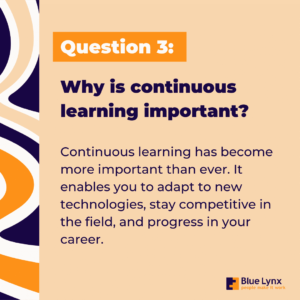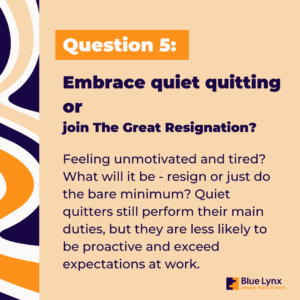5 questions to ask yourself when choosing a career in 2023

According to the Chinese calendar, this is the Year of the Rabbit. However, it might as well be considered the year for new job opportunities. A recent report by Monster.com revealed that an astonishing 96% of the global workforce will be seeking new employment in 2023.
This number is phenomenally high, and 40% of job seekers pointed out the need for a higher income as a main reason. This major life change is predominantly forced by the necessity to keep up with inflation and the rising expenses associated with it.
Others, on the other hand, stated that they had no room for advancement or that they were in a toxic work environment.
Leaving your comfort zone and changing your job can be a daunting task. This article aims to help you evaluate whether you’re making the right decision for yourself. With the job market constantly evolving, it’s vital to consider your options carefully before committing.
Here are 5 key questions to ask yourself when choosing a career in 2023.
Is it better to have an interesting job or a high salary?
When it comes to career choices, many people wonder whether it is better to have an interesting job or a high salary. Choosing a high-paying job over a fun job has its advantages and disadvantages. Ultimately, the decision comes down to your personal preferences and priorities.
On the one hand, having an interesting and intellectually-challenging job can be incredibly fulfilling. People who find their work to be engaging are more likely to feel a sense of purpose in their daily lives. What’s more, the latest research from the University of Warwick suggests that happiness plays a role in boosting productivity at work. Economists conducted several experiments to evaluate the correlation between employee happiness and work effort. The results of these experiments indicated that individuals who were in a happier state were 12% more productive. Therefore, happier employees may be more motivated to continue learning and growing in their field. Additionally, an interesting job can bring a sense of accomplishment and pride, which can be incredibly rewarding.
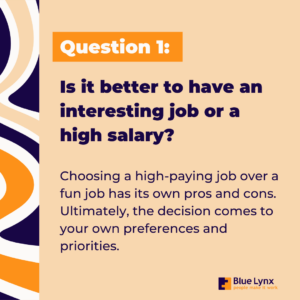
On the other hand, having a high salary can mean being able to save more money, exercise different investment options, and have a more comfortable lifestyle. It can also provide more opportunities for travel, leisure activities, and other luxuries. What’s more, a higher salary can provide a sense of security, especially in times of economic uncertainty like the current global recession.
However, having a high salary doesn’t guarantee that you will be happy with your job. A high salary alone doesn’t provide the sense of purpose and accomplishment that many people look for in their careers. Some people may find themselves sacrificing their happiness for higher income and lacking the job satisfaction they had hoped for.
How do you know if you feel fulfilled?
Feeling fulfilled at work is a crucial aspect to consider when evaluating what is more important. High salary or job satisfaction and overall well-being?
One of the most obvious indicators of job fulfilment is finding a sense of purpose. This happens when you feel like your work is meaningful and you’re making a positive impact. Moreover, you may also find yourself more motivated to put extra effort into your daily tasks.
A positive work-life balance is something that most of us don’t really pay much attention to. However, it may only be one of the most important indicators of job fulfilment. Work-life balance represents the relationship between your work and personal commitments, such as family, friends, and leisure activities. Having a good work-life balance means that you can effectively manage your time and responsibilities in both your professional and private life. We all know that if you manage to do so, you’re able to focus better, you have a sense of accomplishment and pride in your work and you’re more productive.
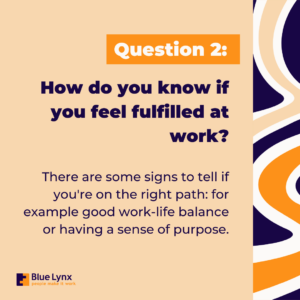
It’s important to note that feeling fulfilled at work is not a one-time event, it’s a continuous process and it can change over time, depending on your circumstances, job or company dynamics.
Finding fulfilment at work is essential for overall well-being and job satisfaction. However, it can be difficult to know where to start.
Here are 5 essential keys to finding fulfilment at work:
1) Having a sense of purpose and feeling like your work makes a positive impact.
2) Feeling challenged and engaged.
3) Continuously learning and growing in your field.
4) Working in an environment that aligns with your values and beliefs.
5) Having a sense of autonomy and control over your work.
By focusing on these key areas, you can increase your chances of finding fulfilment in your career.
What if I don’t want to change careers?
If you’re struggling to evaluate whether it’s time to change careers, consider your motivations carefully first. You could find that it’s not the best course of action in the long run.
It takes a lot of effort, time, and dedication to change careers. It’s possible that the transition between your current employment and your previous one can disrupt many elements of your life. Moreover, it can be so physically and emotionally exhausting that ultimately you start to regret making the change.
Everybody has the option to change occupations at any time in their lives. It’s important to consider whether you’re doing it because of peer pressure or because you recognise it as your own need. Making such major decisions should be motivated by your circumstances.
If your motivations are unclear, you can lack the strength necessary to deal with the inevitable changes and difficulties that come along with career changes.
When do you know you’re thinking of changing jobs for all the wrong reasons:
- You enjoy your work environment, but not your duties
- Responding impulsively to a disruptive event
- Leaving because of a short-term project
- Chasing after a hobby that doesn’t have the potential to bring the bread and butter
- FOMO or peer pressure
Benefits of continuous learning in the workplace
Continuous learning, also known as upskilling, is an ongoing process of acquiring new knowledge, skills, and understanding. In today’s fast-paced global labour market, continuous learning has become more important than ever before. It enables you to adapt to new technologies, stay competitive in your field, and progress in your career.
Why is continuous learning important
- Career advancement
Employers are looking for people who possess a diverse set of skills and can adapt to new technologies.
- Personal growth
Continuous learning can help you develop new skills and knowledge, which can lead to personal growth and self-improvement even outside the workplace
- Economic benefits
Allows you to find your higher earning potential, and achieve better job security.
- Staying competitive
Continuous learning is essential for staying competitive in the job market. After all, you know what they say: “Skills pay the bills”
- Keeping the mind active
Lifelong learning is key to keeping a healthy brain
According to recent studies, 40% of dementia risk can be influenced by lifestyle choices. Engaging in mental activities and obtaining new skills is important not only because it makes you a valuable employee. It is also one of the most effective ways to promote brain health and improve overall well-being.
Examples of continuous learning in the workplace can take many forms, including formal education, on-the-job training, self-study, or attending workshops and conferences. Whichever method you choose, it is essential for staying competitive in today’s job market
Remote work vs. hybrid work: how do you know which one is right for you
Remote work and hybrid work are two popular work models that have emerged in response to the COVID-19 pandemic.
Remote work involves you working from home or another remote location, typically using digital tools and communication technologies to stay connected with the office and collaborate with colleagues. This model offers increased flexibility and work-life balance for employees. It is also extremely beneficial for employers as it leads to potential cost savings from office spaces and other overhead costs.
Hybrid work, on the other hand, involves a mix of remote and in-office work. Employees may split their time between working from home and working in the office, or they may have the option to choose their preferred work location on a day-to-day basis.
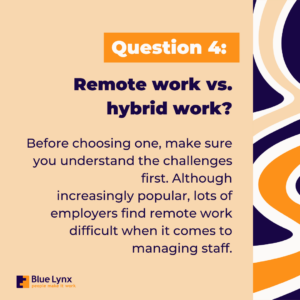
One advantage of remote work is that it can be more convenient and cost-effective for employees. They can work from anywhere with an internet connection and eliminate the need for commuting.
According to research, more than 50% of Dutch workers reside in a municipality other than the one where they work. Nearly 4,5 million of them commute to their places of employment from different cities or provinces, according a poll by Statistics Netherlands.
Remote work also has its challenges. One of the biggest ones is maintaining collaboration and communication among remote employees, which can be difficult when relying on digital tools and technologies. In addition, remote work can lead to feelings of isolation and disconnection from the company and colleagues.
The good news is that hybrid work offers a solution to these challenges, as it provides the benefits of remote work while also promoting in-person collaboration and a sense of community among employees. This can lead to increased employee morale and motivation, as well as improved collaboration and communication.
Embrace quiet quitting or join The Great Resignation
Quiet quitting and The Great Resignation are two distinct examples of quitting a job, and each has its pros and cons. Understanding them can help you make an informed decision on how to navigate a job transition.
According to a recent Gallup study, 50% of the US workforce is quietly leaving their jobs. This is the latest trend in corporate America, as employees refuse to put up with excessive work and decide to set boundaries for their welfare.
Quiet quitting is a trend that refers to the practice of declining effort and engagement in your job. This is often done as a way to prepare to embark on a different career path. This approach is characterised by a gradual reduction in the quality and quantity of work, as well as a decrease in attendance and participation in company events and meetings. Quiet quitting can be a low-risk option if you are looking for a new job or exploring other career opportunities. It allows you to maintain your job security and income while making a transition to the new one.
The Great Resignation, refers to a sudden, dramatic exit from a job, often accompanied by a public announcement. This approach is often adopted by people who have experienced significant stress or burnout. It can also be a result of workplace challenges or conflicts that they believe cannot be resolved. The Great Resignation can be a high-stakes approach, as it involves quitting a job without a plan for the future. It can also hurt your professional reputation and future employment prospects.
One of the cons of quiet is that it can also be viewed as unprofessional and unethical, and it can damage your professional reputation. The great resignation can be a powerful statement of protest or an act of self-care, but it can also be perceived as impulsive and can drive your current and future employer to question your integrity.
When considering a job transition, it’s important to weigh the benefits and risks of each approach and determine what is the best fit for your circumstances unless you want it to backlash.
To sum it up
Choosing a career can be a complex and challenging process. Assessing what kind of work-life balance you’re looking for and the career goals you want to set for yourself in 2023 helps evaluate what your new dream job would look like. Understanding your strengths and weaknesses and recognising your core values will show what kind of an employee you are and how you’d want current and future employers to perceive you.
These 5 career questions aim to help you to be better equipped to make an informed decision that aligns with your passions, skills, and long-term goals. Ultimately, it’s important to remember that your career is not a one-time decision. Rather, it’s a continuous journey, and it’s always possible to make a change if things don’t work out as you expect.

